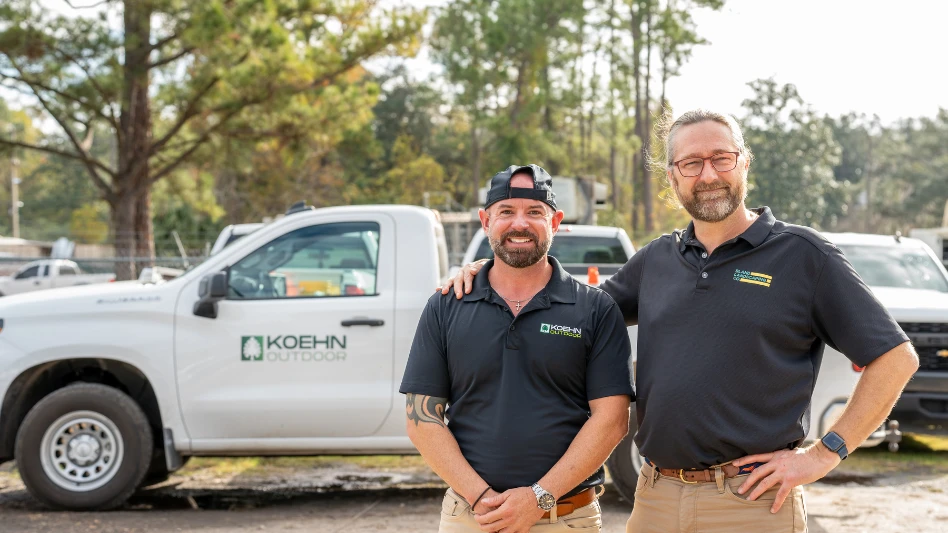
 Implementing a pre-employment drug screening policy altered Doug Freer’s job applicant pool. Photos by Hal Stata.
Implementing a pre-employment drug screening policy altered Doug Freer’s job applicant pool. Photos by Hal Stata.
After a highly qualified employee with six months tenure at Lawn Lad stole the company’s brand-new four-wheel-drive plow truck (it was M.I.A. for several days before it mysteriously reappeared), Doug Freer, president, decided to start drug testing applicants.
“I recovered my truck and the business went on,” Freer says, noting that the worker’s drug, alcohol and gambling issues flew under the radar. “After we instituted a pre-employment drug screening policy and advertised that, our pool of applicants changed dramatically.”
Essentially, Freer “traded up.” He knew of people who wouldn’t apply to work for Lawn Lad because they would not pass the drug test.
Meanwhile, setting a higher bar required a greater commitment from Freer in terms of the way he ran his business. His 40-page employee manual with job descriptions has evolved into a 100-plus page document that includes horticultural study materials and details the company’s financial practices.
 Lawn Lad job candidates apply via the company’s Web site and then are screened by the office manager.Also, Freer markets his business as a professional firm, and having a certified landscape technician (CLT) on staff attracts other serious candidates. He moved out of his home office and into a building three years ago, and he utilizes his Web site to filter applications because he notices that better qualified individuals tend to search for jobs on the Internet and apply electronically.
Lawn Lad job candidates apply via the company’s Web site and then are screened by the office manager.Also, Freer markets his business as a professional firm, and having a certified landscape technician (CLT) on staff attracts other serious candidates. He moved out of his home office and into a building three years ago, and he utilizes his Web site to filter applications because he notices that better qualified individuals tend to search for jobs on the Internet and apply electronically.
“Hire for where you want to be,” Freer advises. “There’s more to hiring someone than getting work done. What you are really doing is making a commitment to grow your business, so you need to look at the process more strategically than hiring to fill your needs now.”
Process is the operative word. Freer advocates creating job descriptions so hiring decisions are targeted. He allows leeway for “new positions” because he knows these job roles will evolve.
“I learned that the first person in that position will fail because they are a guinea pig,” he says. “I try to address that fact during the interview by saying, ‘This is a new position. Are you flexible and willing to work with me as we evolve here?’”
Also, employers must be prepared to make payroll. Under-the-table pay does not attract committed workers. Regarding pay, Freer has always paid on time – but he has learned to never pay early, even if a hard-working employee needs help. “Early on, I would get pressured to give loans – little advances,” Freer says. “That was frustrating because it created an atmosphere where you play favorites. And if you establish a precedent that you are willing give loans, then employees will think, ‘I’ll just go to the boss early and ask him for money.’”
Freer always, always pays on time. “You make a commitment whether that money comes out of your own pocket or you have to get a loan from the bank to balance your cash flow,” he says.
Commitment is a word that Freer uses liberally in hiring discussions.
Taking his company’s pledge to hire quality employees to the next level, he has implemented a three-step application process. Candidates apply through the Lawn Lad Web site after learning more about the business. They are screened by Freer’s office manager, who notifies applicants of their status. Those who move on answer a questionnaire. From there, Freer’s manager can decide which applicants to interview via phone. Finally, candidates are invited for an in-person interview. Out of 90 applicants this spring, 12 were interviewed over the phone and two were hired.
But Freer is adamant about maintaining his hiring standards. No matter what. “Hire slowly and fire quickly,” he says, reciting an HR mantra he appreciates.
The author is a freelance writer based in Bay Village, Ohio.
Jump To:
Introduction
Small Business - Less than $500,000
Large Busienss - More than $2 million

Explore the July 2009 Issue
Check out more from this issue and find your next story to read.
Latest from Lawn & Landscape
- Analysis of an entrepreneur
- Terra Nova's Sedum Conga Line variety wins Best of 2024 Perennial award
- Different ways to distribute
- Case's 580EV electric backhoe loader wins Good Design Award
- Davey Tree promotes Dan Herms to VP, GM of Davey Institute
- Caterpillar's Cheryl H. Johnson set for April retirement
- Registration open for sixth annual Lawn & Landscape Technology Conference
- 12 interview questions to help you hire winners





